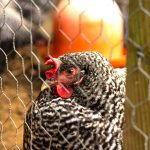Chickens, like all animals, have specific needs that must be met for optimal health and well-being, particularly during winter. These requirements include a warm, dry environment, access to fresh water, and a nutritious diet. Proper ventilation in the coop is essential to prevent moisture and ammonia buildup, which can lead to respiratory problems.
Extra warmth and comfort may be necessary to prevent frostbite and other cold-related issues. Chickens are more vulnerable to cold than heat due to their limited ability to regulate body temperature compared to mammals. They can suffer from frostbite and hypothermia if not provided with adequate shelter and warmth.
A well-insulated coop is crucial for chickens to seek refuge from cold temperatures. Constant access to fresh water is vital, as dehydration can occur even in cold weather. Understanding and addressing these needs is essential for maintaining a healthy and thriving flock throughout the winter months.
By providing appropriate shelter, nutrition, and care, chicken owners can help their birds successfully navigate the challenges of cold weather.
Table of Contents
- 1 Providing Proper Shelter for Chickens in Winter
- 2 Ensuring Adequate Ventilation in the Coop
- 3 Offering Warmth and Comfort for Chickens in Winter
- 4 Providing a Nutritious and Balanced Diet for Chickens in Winter
- 5 Managing Water Sources for Chickens in Winter
- 6 Monitoring the Health and Well-being of Chickens in Winter
- 7 FAQs
- 7.1 What are some important considerations for keeping chickens in Wisconsin during the winter?
- 7.2 What type of shelter is best for chickens during the winter in Wisconsin?
- 7.3 How can I ensure that my chickens have access to fresh water during the winter in Wisconsin?
- 7.4 How should I adjust my chickens’ diet to meet their increased energy needs during the winter in Wisconsin?
- 7.5 What are some common health concerns for chickens during the winter in Wisconsin?
Key Takeaways
- Chickens need extra care in winter due to their susceptibility to cold temperatures and frostbite
- Proper shelter for chickens in winter should be draft-free, insulated, and well-ventilated
- Adequate ventilation in the coop is crucial to prevent moisture buildup and respiratory issues
- Providing warmth and comfort for chickens can be achieved through heating lamps, heated perches, and cozy bedding
- A nutritious and balanced diet for chickens in winter should include high-quality feed, grains, and access to fresh water at all times
Providing Proper Shelter for Chickens in Winter
Insulation and Bedding
The coop should be well-insulated to keep the chickens warm and dry. This can be achieved by using materials such as straw, hay, or wood shavings for bedding, as well as adding extra insulation to the walls and roof of the coop.
Avoiding Drafts and Overcrowding
Additionally, it’s important to ensure that the coop is free from drafts and leaks, as these can contribute to a damp and chilly environment. Providing adequate space for the chickens is also essential, as overcrowding can lead to stress and aggression within the flock.
Coop Design and Layout
In addition to insulation and space, it’s important to consider the layout and design of the coop when providing shelter for chickens in winter. The coop should be positioned in a location that receives plenty of sunlight during the day, as this can help to naturally warm the interior. It’s also important to ensure that the coop is well-ventilated to prevent the buildup of moisture and ammonia, which can lead to respiratory issues for the chickens. Furthermore, providing roosting bars and nesting boxes within the coop can give the chickens a sense of security and comfort during the colder months.
Ensuring Adequate Ventilation in the Coop

Adequate ventilation is crucial for maintaining a healthy environment for chickens in winter. Proper ventilation helps to remove excess moisture and ammonia from the coop, which can build up from chicken droppings and respiratory moisture. Without proper ventilation, these conditions can lead to respiratory issues and other health problems for the chickens.
It’s important to strike a balance between keeping the coop warm and dry while also allowing for adequate airflow. This can be achieved by providing vents or windows that can be opened or closed as needed, as well as ensuring that there are no drafts or leaks in the coop. By understanding the importance of ventilation, you can create a comfortable and healthy environment for your chickens to thrive in during the winter months.
In addition to removing excess moisture and ammonia, proper ventilation also helps to regulate the temperature inside the coop. During winter, it’s important to provide enough ventilation to prevent overheating while also avoiding drafts that can make the coop too cold. This can be achieved by providing adjustable vents or windows that can be opened or closed depending on the weather conditions.
It’s also important to ensure that the coop is well-insulated to retain heat while still allowing for airflow. By understanding these principles of ventilation, you can create an environment that is conducive to the health and well-being of your flock throughout the winter.
Offering Warmth and Comfort for Chickens in Winter
In addition to providing proper shelter and ventilation, offering warmth and comfort is essential for ensuring the well-being of chickens in winter. There are several ways to achieve this, such as using heat lamps or heated pads in the coop to provide extra warmth during particularly cold nights. It’s important to ensure that these heating sources are safe and secure, as well as positioned away from flammable materials such as bedding or nesting boxes.
Additionally, providing plenty of bedding material such as straw or wood shavings can help to insulate the coop and provide a cozy environment for the chickens. By understanding the importance of warmth and comfort, you can help your flock stay healthy and happy throughout the winter. Another way to offer warmth and comfort for chickens in winter is by providing them with access to natural sunlight during the day.
Positioning the coop in a location that receives plenty of sunlight can help to naturally warm the interior and provide a sense of well-being for the chickens. Additionally, allowing the chickens access to an outdoor run during sunny days can give them an opportunity to soak up some warmth and exercise. By understanding these simple yet effective methods of providing warmth and comfort, you can help your chickens stay content and healthy throughout the winter months.
Providing a Nutritious and Balanced Diet for Chickens in Winter
A nutritious and balanced diet is essential for maintaining the health and well-being of chickens in winter. During colder months, it’s important to provide your flock with a diet that is rich in protein, vitamins, and minerals to support their immune system and overall health. This can be achieved by offering high-quality layer feed that is specifically formulated for egg-laying hens, as well as supplementing their diet with fresh fruits and vegetables.
Additionally, providing access to grit and oyster shells can help to support their digestive health and egg production. By understanding the nutritional needs of your flock, you can ensure that they receive a diet that supports their health throughout the winter. In addition to providing a nutritious diet, it’s important to ensure that your chickens have access to fresh water at all times.
Dehydration can occur even in cold weather, so it’s crucial to regularly check their water sources for freezing or contamination. Using heated waterers or adding warm water to their drinking containers can help to prevent freezing and ensure that they stay properly hydrated. By understanding the importance of a balanced diet and access to fresh water, you can help your flock stay healthy and productive throughout the winter months.
Managing Water Sources for Chickens in Winter

Preventing Dehydration and Contamination
Chickens require access to fresh water at all times, even in cold weather, as dehydration can occur quickly. It’s essential to regularly check their water containers for freezing or contamination, as well as provide heated waterers or add warm water as needed.
Preventing Freezing and Insulation
Positioning their water containers in a sunny spot or using insulated covers can help prevent freezing during particularly cold days. By understanding these simple yet effective methods of managing water sources, you can ensure that your flock stays properly hydrated throughout the winter.
Access to Water Outside the Coop
If your chickens have access to an outdoor run or free-range area, it’s crucial to provide them with unfrozen water sources throughout the day. This can be achieved by using heated waterers or regularly checking their outdoor water containers for freezing or contamination. By understanding these principles of managing water sources both inside and outside of the coop, you can help your flock stay healthy and hydrated throughout the winter months.
Monitoring the Health and Well-being of Chickens in Winter
Monitoring the health and well-being of chickens in winter is essential for identifying any potential issues early on and taking appropriate action. It’s important to regularly check on your flock for signs of illness or distress, such as lethargy, decreased appetite, or abnormal behavior. Additionally, checking their feet for signs of frostbite or their combs for signs of discoloration can help identify any cold-related ailments.
By understanding these simple yet effective methods of monitoring their health, you can ensure that any issues are addressed promptly and effectively. In addition to physical health, it’s also important to monitor their mental well-being during winter. Chickens may experience stress or boredom from being cooped up during cold weather, so providing them with enrichment activities such as hanging treats or providing perches can help keep them stimulated and content.
Additionally, spending time with your flock and observing their behavior can help you identify any changes or issues that may arise during winter. By understanding these principles of monitoring their overall well-being, you can ensure that your flock stays healthy and happy throughout the winter months. In conclusion, understanding the specific needs of chickens in winter is crucial for ensuring their health and well-being during colder months.
By providing proper shelter, ventilation, warmth, a nutritious diet, managed water sources, and monitoring their health, you can create an environment that supports their physical and mental well-being throughout winter. Taking these factors into consideration will help you create a comfortable and safe environment for your flock so they can thrive even when temperatures drop.
If you’re looking for more tips on how to keep chickens in the winter, check out this article on turning a shed into a chicken coop from Poultry Wizard. It offers valuable insights on how to repurpose existing structures to provide a warm and safe environment for your chickens during the cold Wisconsin winter.
FAQs
What are some important considerations for keeping chickens in Wisconsin during the winter?
Some important considerations for keeping chickens in Wisconsin during the winter include providing adequate shelter, ensuring access to fresh water, and adjusting their diet to meet their increased energy needs.
What type of shelter is best for chickens during the winter in Wisconsin?
A well-insulated and draft-free coop is best for chickens during the winter in Wisconsin. It should also have good ventilation to prevent moisture buildup.
How can I ensure that my chickens have access to fresh water during the winter in Wisconsin?
To ensure that your chickens have access to fresh water during the winter in Wisconsin, consider using heated waterers or manually refreshing their water multiple times a day to prevent it from freezing.
How should I adjust my chickens’ diet to meet their increased energy needs during the winter in Wisconsin?
You can adjust your chickens’ diet to meet their increased energy needs during the winter in Wisconsin by providing them with high-quality, high-protein feed and offering occasional treats such as scratch grains or mealworms.
What are some common health concerns for chickens during the winter in Wisconsin?
Some common health concerns for chickens during the winter in Wisconsin include frostbite, respiratory issues, and decreased egg production. It’s important to monitor your chickens closely and address any health issues promptly.
Meet Walter, the feathered-friend fanatic of Florida! Nestled in the sunshine state, Walter struts through life with his feathered companions, clucking his way to happiness. With a coop that’s fancier than a five-star hotel, he’s the Don Juan of the chicken world. When he’s not teaching his hens to do the cha-cha, you’ll find him in a heated debate with his prized rooster, Sir Clucks-a-Lot. Walter’s poultry passion is no yolk; he’s the sunny-side-up guy you never knew you needed in your flock of friends!







